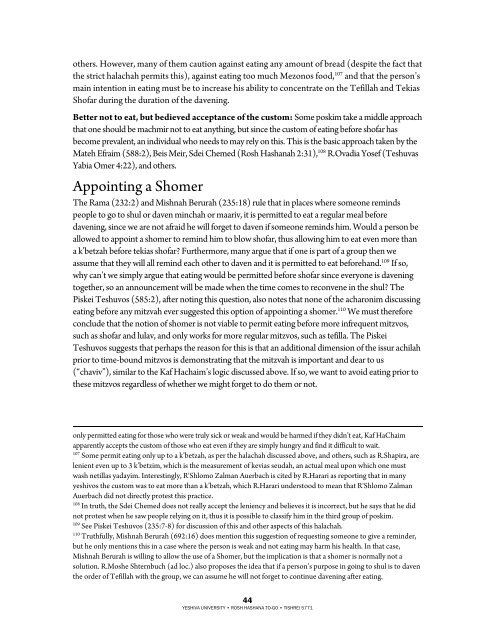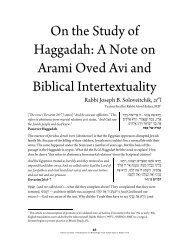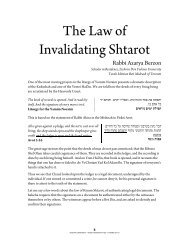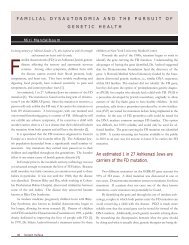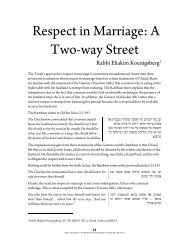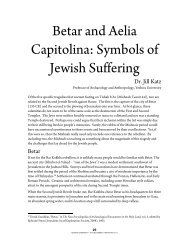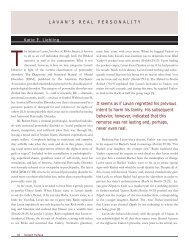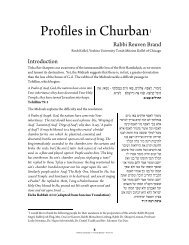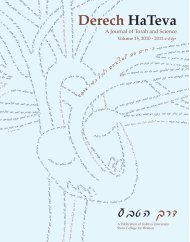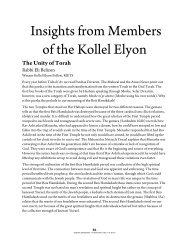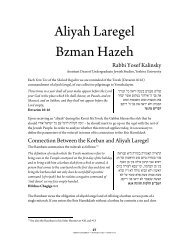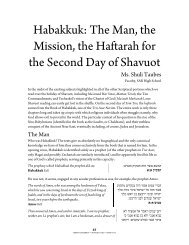YESHIVA UNIVERSITY • ROSH HASHANA TO-GO ... - YUTorah.org
YESHIVA UNIVERSITY • ROSH HASHANA TO-GO ... - YUTorah.org
YESHIVA UNIVERSITY • ROSH HASHANA TO-GO ... - YUTorah.org
You also want an ePaper? Increase the reach of your titles
YUMPU automatically turns print PDFs into web optimized ePapers that Google loves.
others. However, many of them caution against eating any amount of bread (despite the fact that<br />
the strict halachah permits this), against eating too much Mezonos food, 107 and that the person’s<br />
main intention in eating must be to increase his ability to concentrate on the Tefillah and Tekias<br />
Shofar during the duration of the davening.<br />
Better not to eat, but bedieved acceptance of the custom: Some poskim take a middle approach<br />
that one should be machmir not to eat anything, but since the custom of eating before shofar has<br />
become prevalent, an individual who needs to may rely on this. This is the basic approach taken by the<br />
Mateh Efraim (588:2), Beis Meir, Sdei Chemed (Rosh Hashanah 2:31), 108 R.Ovadia Yosef (Teshuvas<br />
Yabia Omer 4:22), and others.<br />
Appointing a Shomer<br />
The Rama (232:2) and Mishnah Berurah (235:18) rule that in places where someone reminds<br />
people to go to shul or daven minchah or maariv, it is permitted to eat a regular meal before<br />
davening, since we are not afraid he will f<strong>org</strong>et to daven if someone reminds him. Would a person be<br />
allowed to appoint a shomer to remind him to blow shofar, thus allowing him to eat even more than<br />
a k’betzah before tekias shofar? Furthermore, many argue that if one is part of a group then we<br />
assume that they will all remind each other to daven and it is permitted to eat beforehand. 109 If so,<br />
why can’t we simply argue that eating would be permitted before shofar since everyone is davening<br />
together, so an announcement will be made when the time comes to reconvene in the shul? The<br />
Piskei Teshuvos (585:2), after noting this question, also notes that none of the acharonim discussing<br />
eating before any mitzvah ever suggested this option of appointing a shomer. 110 We must therefore<br />
conclude that the notion of shomer is not viable to permit eating before more infrequent mitzvos,<br />
such as shofar and lulav, and only works for more regular mitzvos, such as tefilla. The Piskei<br />
Teshuvos suggests that perhaps the reason for this is that an additional dimension of the issur achilah<br />
prior to time-bound mitzvos is demonstrating that the mitzvah is important and dear to us<br />
(“chaviv”), similar to the Kaf Hachaim’s logic discussed above. If so, we want to avoid eating prior to<br />
these mitzvos regardless of whether we might f<strong>org</strong>et to do them or not.<br />
only permitted eating for those who were truly sick or weak and would be harmed if they didn’t eat, Kaf HaChaim<br />
apparently accepts the custom of those who eat even if they are simply hungry and find it difficult to wait.<br />
107 Some permit eating only up to a k’betzah, as per the halachah discussed above, and others, such as R.Shapira, are<br />
lenient even up to 3 k’betzim, which is the measurement of kevias seudah, an actual meal upon which one must<br />
wash netillas yadayim. Interestingly, R'Shlomo Zalman Auerbach is cited by R.Harari as reporting that in many<br />
yeshivos the custom was to eat more than a k’betzah, which R.Harari understood to mean that R'Shlomo Zalman<br />
Auerbach did not directly protest this practice.<br />
108 In truth, the Sdei Chemed does not really accept the leniency and believes it is incorrect, but he says that he did<br />
not protest when he saw people relying on it, thus it is possible to classify him in the third group of poskim.<br />
109 See Piskei Teshuvos (235:7-8) for discussion of this and other aspects of this halachah.<br />
110 Truthfully, Mishnah Berurah (692:16) does mention this suggestion of requesting someone to give a reminder,<br />
but he only mentions this in a case where the person is weak and not eating may harm his health. In that case,<br />
Mishnah Berurah is willing to allow the use of a Shomer, but the implication is that a shomer is normally not a<br />
solution. R.Moshe Shternbuch (ad loc.) also proposes the idea that if a person’s purpose in going to shul is to daven<br />
the order of Tefillah with the group, we can assume he will not f<strong>org</strong>et to continue davening after eating.<br />
44<br />
<strong>YESHIVA</strong> <strong>UNIVERSITY</strong> <strong>•</strong> <strong>ROSH</strong> <strong>HASHANA</strong> <strong>TO</strong>-<strong>GO</strong> <strong>•</strong> TISHREI 5771


